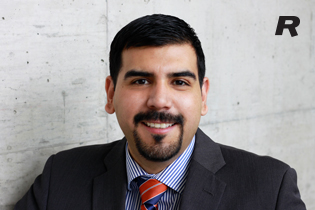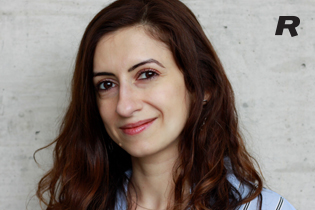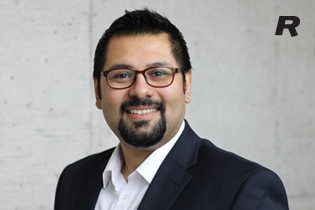 Jonathan D. Almanza was poised to do well in Canada.
Jonathan D. Almanza was poised to do well in Canada.
Before moving to Toronto, he was a financial controller for a multi-national auto parts supplier headquartered in Mexico. Almanza, who has studied international finance in the United States and France and earned a master’s degree in finance from a top-ranked school in Mexico, is fluent in English, French and Spanish. He should have been eligible for a number of high-level Canadian jobs in finance.
After living in Canada for five years, and working as an analyst at a Toronto bank for most of that time, he felt like his career wasn’t progressing in proportion to his efforts and abilities.
“Business Edge pushes you to learn more about yourself and teaches you how to effectively showcase your value.”
—Jonathan D. Almanza, Senior Manager, Strategy and Capabilities, TD
“I always had a healthy work ethic and I was a top performer on my team, but I just couldn’t figure out why I wasn’t landing the roles that interested me,” he explains.
Frustrated by his career development but still hopeful, Almanza enrolled in the Business Edge program at Rotman after seeing the boost that it gave to a colleague’s career. With that, he took the first step to owning and transforming his career in Canada.
About Business Edge
At its core, the Business Edge program, which is offered by the Intercultural Skills Lab at Rotman, is a career transformation program for internationally-educated professionals who have not yet reached their full potential working in Canada.
The Lab delivers the program in two ways: with Business Edge Campus, learners attend weekly in-person sessions and coaching, while with Business Edge Digital, participants complete the bulk of their work through webinars and online coaching, coming to the Rotman campus for four in-person sessions.
The program is tailored for settled newcomers. To be eligible for Business Edge, individuals must have worked in the country for at least one year, but lived in Canada for less than eight years.
Most Business Edge participants have earned MBAs or other graduate degrees, worked at the senior management levels for major corporations back in their home countries, and conducted business globally.
At first glance, it’s confusing why these highly educated and experienced newcomers would find themselves chronically underemployed, even years after arriving in Canada. But in most cases, the major issue is that in Canada, a country known for its diversity, there is undeniable cultural component embedded in every workplace.
“There are certain unspoken and unwritten rules about navigating the Canadian workplace that most newcomers simply don’t know about. It is keeping them from advancing and reaching their true potential here,” explains Sabina Michael, manager of the Intercultural Skills Lab at Rotman.
Business Edge is not about downplaying one’s cultural identity or defining hard-and-fast rules for working in Canada — which seems impossible, given how diverse work teams are in this country.
Rather, the program encourages professionals to consider the range of cultural values and attitudes that exist in the organizations they work for, and how their actions and behaviours might be perceived by others. Ultimately, graduates walk away with an understanding of how to effectively communicate, lead, interact with others, and manage their careers, in any work situation.
Putting in hard work
The Business Edge program has a strong track record of success. Approximately 72 per cent of graduates secured a promotion or negotiated a raise within a year after completing the program. On average, graduates boost their salary by 42 per cent, within one year of finishing the program.
Their employers benefit too. Business Edge graduates typically land in positions where they can make full use of their knowledge and experience to make their companies, and the country, more competitive. The competencies that graduates gain from Business Edge have a positive ripple effect on their teams and colleagues.
These rewards come through hard work and self-reflection.
For six months, Business Edge participants complete sessions grounded in four core themes: advanced communications, intercultural communication skills, leadership and career management. They also receive hours of peer and personalized one-on-one coaching.
“It’s essentially a career boot-camp,” explains Almanza, who recalls the many hours spent identifying key skills gained from his years of work experience, analyzing his strengths and weaknesses, and formulating a career plan that fully leveraged his competencies.
“It’s hard work that you can’t avoid doing, but it’s meaningful. I took my Business Edge homework and used it as a guide for coffee chats and interviews.”
In his case, Almanza successfully made connections at his organization to secure a managerial position involving innovation and new product development, which was in line with the career plan he crafted during the program.
“The work pays off. The program pushes you to learn more about yourself and teaches you how to effectively showcase your value.”
Getting a handle on communication
 Fellow Business Edge grad Hala Karim remembers the hours of work involved with completing the program.
Fellow Business Edge grad Hala Karim remembers the hours of work involved with completing the program.
Karim, who earned her master’s degree in quality, safety and environment from Germany, previously oversaw quality improvement for a large transportation company in the United Arab Emirates. She could not find work in her field after settling in Canada, eventually taking on a retail role.
After reconfiguring her resume and setting up a number of informational meetings — with guidance from her peers and faculty at Business Edge — she eventually landed a job in her field, two months after finishing the program. Today, two years after completing the program, she’s been promoted twice and is now a team lead at the Ontario Ministry of Transportation — looking after quality improvement and efficiency projects at the organization.
For Karim, Business Edge set off a domino effect.
“It’s amazing. From one coffee chat months ago, which I arranged because of Business Edge, I was invited in for an interview and I landed the job. From there, I got another opportunity and then another.”
“From one coffee chat months ago, which I arranged because of Business Edge, I was invited in for an interview and I landed the job.”
—Hala Karim, Team Lead, Program Delivery, Ontario Ministry of Transportation
Among the many eye-opening moments she can recall, Karim says that the program’s focus on language and communication, and how it broke down intercultural differences was particularly useful.
“Small things led me to where I am today,” says Karim. “Just understanding the differences in work culture — the importance of striking up a conversation at work, adding a phrase like ‘could you please…’ before questions makes the difference in putting people at ease.”
A safe space
 For others, it was the openness of the program that was most powerful.
For others, it was the openness of the program that was most powerful.
“It’s a safe environment to share and collect feedback,” explains Business Edge graduate Farhan Mahboob, who led and supported high-profile corporate financing and planning projects back in Pakistan, before immigrating to Canada.
Mahboob applied his Business Edge knowledge to network in his field and eventually secure a promotion, a business consultant role with capital markets and wealth management at CIBC.
“This program works. If you put in the time, it will work for you.”
—Farhan Mahboob, Business Consultant, Capital Markets and Wealth Management, CIBC
While he’s happy with the recent advancement, he’s focused on completing the career plan he designed in the program. Still, he’s taken time to come back to the Business Edge program and speak with newcomers who are interested in applying and enrolling in the program.
“It’s empowering and humbling to come back, a year after completing Business Edge, to tell people what I’ve gotten out of it and what I’ve accomplished since. I want them to know that this program works. If you put in the time, it will work for you.”